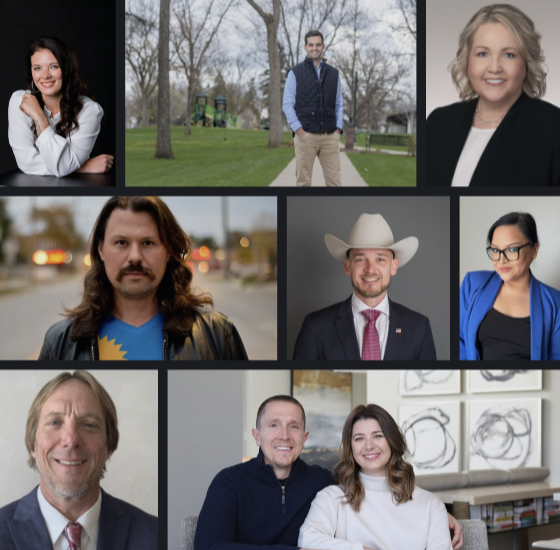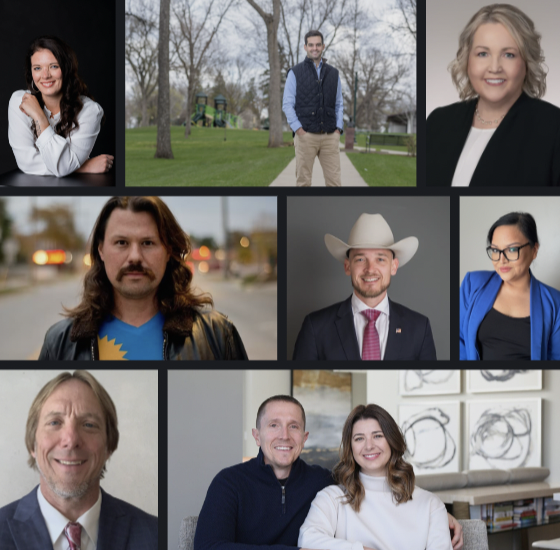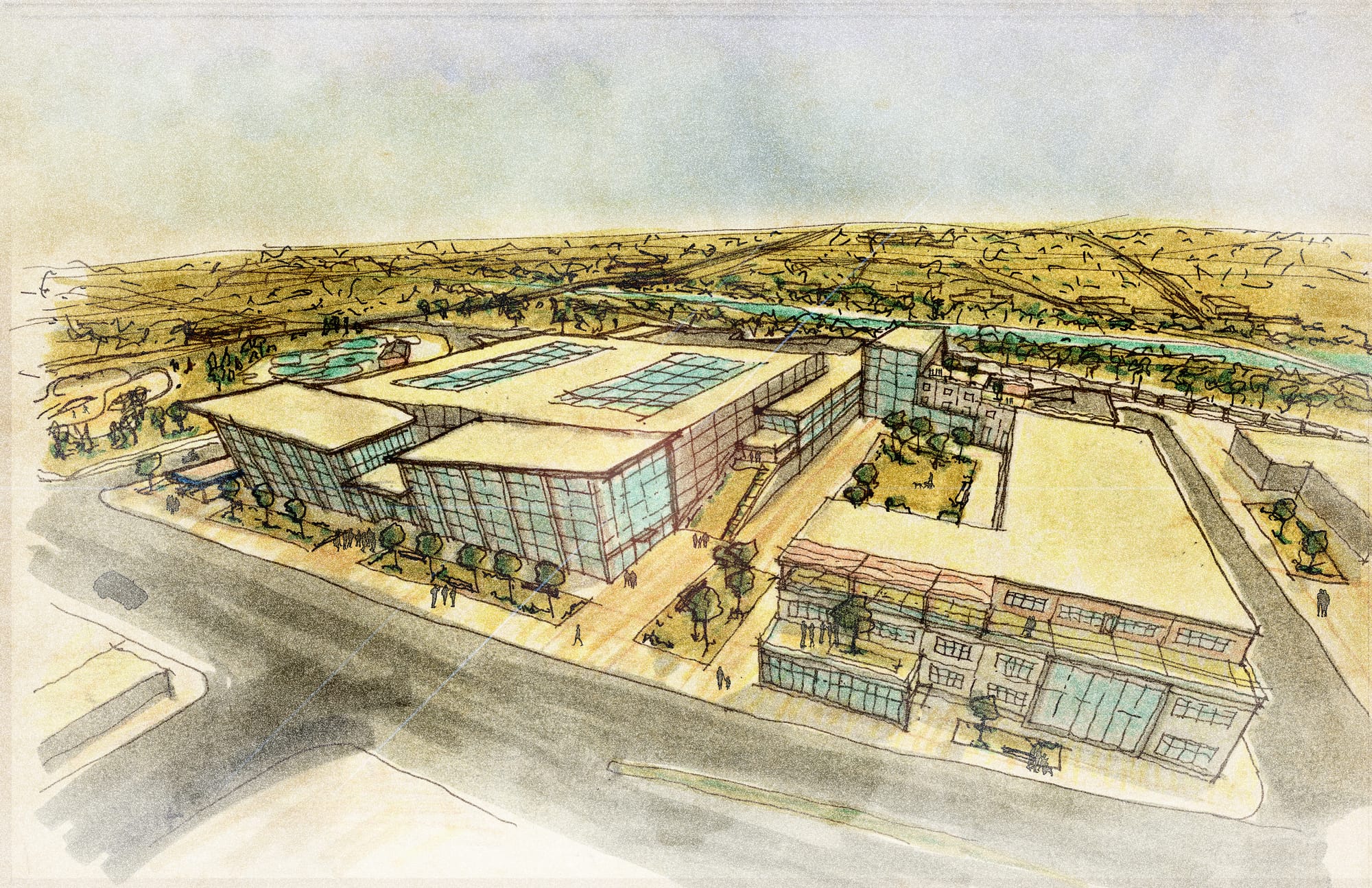Editor's note: This is the fourth in a multi-part series on the 2024 city and school board election. Stay tuned for more on the candidates views on various issues – oh, and make sure you're registered to vote by March 25 or, like, what is this all for?
Simplified: Sioux Falls Simplified sat down with each of the eight candidates hoping to have a seat on the City Council. Candidates were all asked (approximately) the same set of questions. Here's what they had to say about the mayor's 2050 vision for the Riverline District.
Why it matters
- Mayor Paul TenHaken last month laid out a 2050 vision for the Riverline District – essentially an eastward extension of downtown – that includes a new convention center.
- TenHaken also noted the first step would be purchasing the land, a 10-acre site near the 10th Street viaduct, for an estimated cost of $8 million.
- The long-term pitch is for the existing convention center to be repurposed into indoor recreation space.
Another quick note: Candidates are listed in the order in which they're shared on the city election website. Answers are edited for length and clarity.
What do you think of the mayor's 2050 vision for the Riverline District? And, more immediately, should the city purchase that piece of land?
Jennifer Sigette, Northwest District*: "I have drank the kool-aid on that one (referring to the plan for a downtown convention center)."
- Sigette noted that she also "could be supportive" of purchasing the land, but she would like to see more studies on whether indoor recreation is the best long-term use of the existing convention center – noting that she's not convinced people will go to that part of town for indoor recreation.
Miranda Basye, Northeast District: "My immediate reaction to (the 2050 vision) is from a business and economic development sense, to me it makes sense. I just think about the location of our current convention center, and we're likely missing out on opportunities."
- Basye also noted the neighborhood around the Riverline District as the home for a lot of services for unhoused people, and that she's got a lot more questions on what the long-term plan would be for those services.
"I think that parcel of land would be a strategic addition to the core of the city," she added.
Neil Jeske, Northeast District: "I think it'd be a better idea to not build downtown because I have concerns about getting all the traffic and the parking.
- I think it'd be better served for our community to build duplexes, triplexes, four-plexes, single family homes so ppl can actually purchase these homes.
- I would have to obviously have to do more research, but it might be better to build (a convention center) onto the airport or over in that area. We have the Empire Mall in the south, and if you built this project on the north side of town it'd economically benefit that area."
Jeske also said he would not support purchasing the land now being called the "Riverline District."
David Zokaites, Northeast District: "I'm kind of leery about the city getting too closely involved in construction projects because they have a bad history of overspending and supporting the wrong builders. ... But it's really nice to have a cool riverfront."
- Zokaites also noted that he'd be reluctant to purchase the land because of a lack of transparency within the current administration.
Ryan Spellerberg, Southwest District*: I think it would be hard for the city not to purchase that land. It just opens us up for more development down in that area that otherwise won't be available.
- I'm a very fiscally driven person, so I'd need to see the cost. I think it's a great idea, sounds like it's a real need, but there's got to be a cost-benefit analysis.
Jordan Deffenbaugh, At-Large: "There needs to be a dialogue. Come down here and talk to the neighbors who don't know anything about it. Go to their doorstep and tell them about it.
- There is plenty of evidence to suggest, say, if you invest oodles of money right along a working-class neighborhood, a neighborhood where many of the residents are elderly or on fixed incomes – pouring money into an investment can cause massive reverberations throughout a neighborhood that are incredibly detrimental."
- He also said he's not against the plan, and he would be in favor of purchasing the land if the city and councilors talk to constituents.
Richard Thomason, At-Large: "There is a need for more convention center space ... (I see) pros and cons to that location and want to make sure we're looking at all the options.
- (Regarding the land purchase) I would like to get elected first and see the finer details. But from what I know right now, it's a good idea to purchase the land."
Allison Renville, At-Large: "I don't know who else is going to buy it. If the city isn't the one intervening then it goes to a corporation and then all of a sudden we lose control over everything."
- Renville also suggested looking at other opportunities to sustain what buildings already exist and finding space to create opportunities for even more demographics. She said she wants to see equity-focused opportunities, like, for example, a downtown Indian Center.
*Sigette and Spellerberg will not be listed on the ballot because their races are uncontested. Since they'll be representing essentially half the city, Sioux Falls Simplified still included them here so voters know their public officials.
Want to learn more about the candidates?
See who they are and why they're running here:

And then get their thoughts on growth:

And then see what they have to say about maintaining roads:

And then keep checking back for more topics in the coming weeks leading up to the April 9 election.



